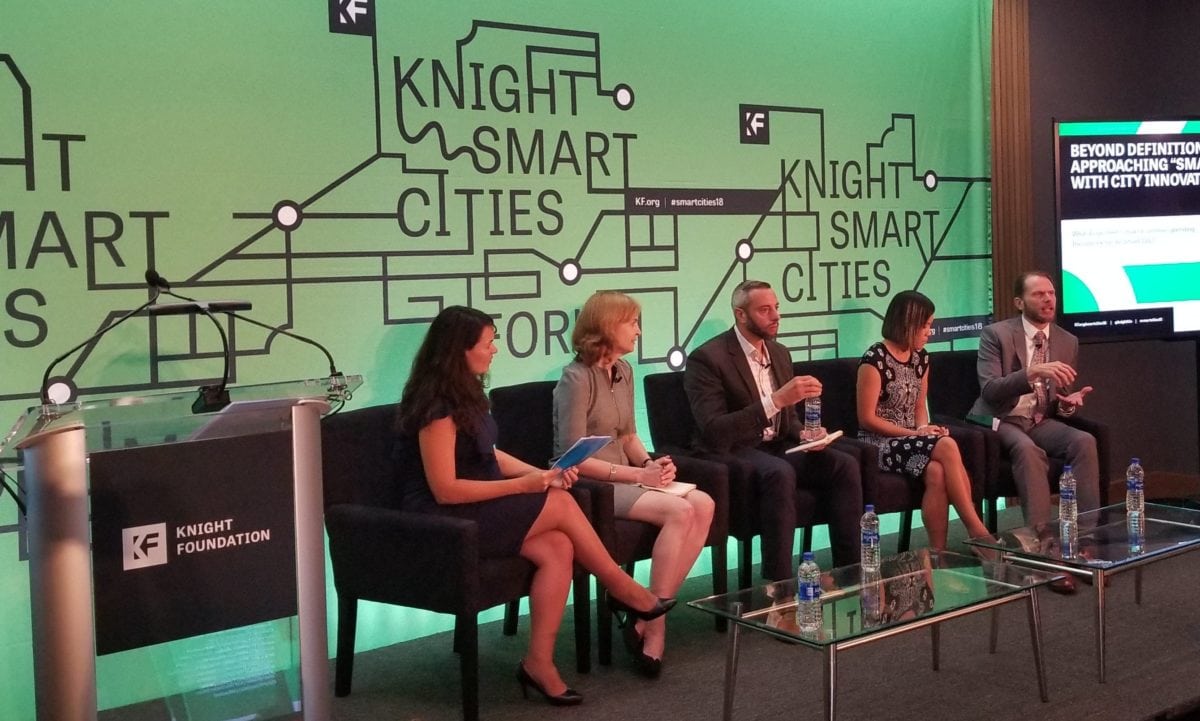RIP to PhillyCoin, or maybe JawnCoin, or GrittyCoin — none of them are happening right now, or any time in the near future.
After weeks of focused research and internal discussion, feedback from crypto enthusiasts and plenty of online chatter, Philly Chief Information Officer Mark Wheeler told Technical.ly that city government will not be bringing philanthropy-minded cryptocurrency CityCoins to Philadelphia.
We first heard rumblings of the crypto possibility early last month, when Wheeler confirmed that the Office of Innovation and Technology (OIT) was researching CityCoins. The currency, powered by the Stacks protocol, offers a way for people to financially support their city, with 30% of the mined currency automatically going to a “city wallet” for certain civic projects. It’s currently set up in Miami, New York City and Austin.
“Where we landed was that we’re not going to pursue an opportunity with CityCoins, or any other similar program at this time,” Wheeler said.
Why conversations stopped
It came down to the fact that the program is very new, and that it would use crypto to fundraise. The City’s standard for fundraising is to be very specific in what that funding will be used for, and to be limited in fundraising for those goals, the CIO said. In contrast, CityCoins’ model is to raise funds on an ongoing basis. Plus, cryptocurrency in general is volatile.
The newness of the program also raises questions about its thoroughness. Wheeler said there could be other funding programs that fit better and could come to fruition after a request-for-proposal process. But local government at the moment doesn’t quite have the capacity to have an official Philadelphia cryptocurrency — and there isn’t a legal means for a government in Pennsylvania to hold cryptocurrency at the moment anyway, he said.

When the idea for a Philly-focused CityCoin was first introduced, quick naysayers included the City’s former chief data officer, Mark Headd, who called the concept a “gimmick,” if not something downright exclusionary. A significant portion of Philadelphians likely wouldn’t be able to invest in the program (and thus, potentially, directly benefit) at all, Headd noted, given that some don’t have access to high-speed internet or a home computer.
When discussing the idea for introducing CityCoin in February, Wheeler acknowledged this, and noted a potential equity focus for a Philly program — namely that proceeds could have gone to digital equity and housing efforts, or arts programs that have lost funding in recent years.
For now, though, it’s a no go.
“It seems exciting, definitely novel and we had some very good discussions,” Wheeler said. “I think it was super healthy for us to be talking about cryptocurrencies and the different technologies behind it. It’s basically started that process, that we’ll be exploring it more as other issues or opportunities come up.”
The City’s finance director and treasurer can keep their eyes on any regulatory changes or opportunities coming down the line at the state or federal level, but it’s outside of OIT’s scope to be making those decisions, Wheeler said.
Other civic tech advancements to watch
Wheeler has been interested in blockchain technologies for a while, and is open to hearing about more use cases for the technology. Since the announcement that the City would be looking into CityCoins last month, Wheeler said he’s been getting some technical insights about how blockchain can be used in city government.
Verified credentials — an open standard for digital identification credentials — is one of the better use cases, he said, and has promise at the local level. Private businesses like Microsoft have embraced the technology recently, and Vietnam’s government has begun researching digital identity on blockchain.
“Areas ripe for transformation are birth certificates, marriage licenses, passports, visas, medical records, driving licenses, vaccinations, and national identification cards, etc,” notes a legal report on Vietnam’s research. “Blockchain technology, with its permanent, transparent, and inalterable system of record keeping, lends itself perfectly to the digitization of current document-laden records.”
Blockchain technologies also offer some privacy and protection from vulnerable networks, like providing some access to “borderless” currency options throughout the conflict between Ukraine and Russia. Many people are watching to see how the crypto market is affected by the conflict and are using the currencies to fundraise outside of traditional methods.
Waiting for the right Web3 ‘test case’
Overall, Wheeler’s glad the conversation about CityCoins presented an opportunity to talk about Web3 technologies and their possible use-cases in city government.
“It’s not us looking at the technology to solve the problem, it’s waiting for the right opportunity where it might be a good test case, and it might have a value proposition,” he said.
So, TBD on other blockchain-related projects coming down the pipeline. And while it looks like Philadelphia won’t have a PhillyCoin or any other city-related crypto for a long time, you can always remember the fictional crypto Hoagcoin we discovered last year. You’ll live on in our hearts, Hoagcoin.







